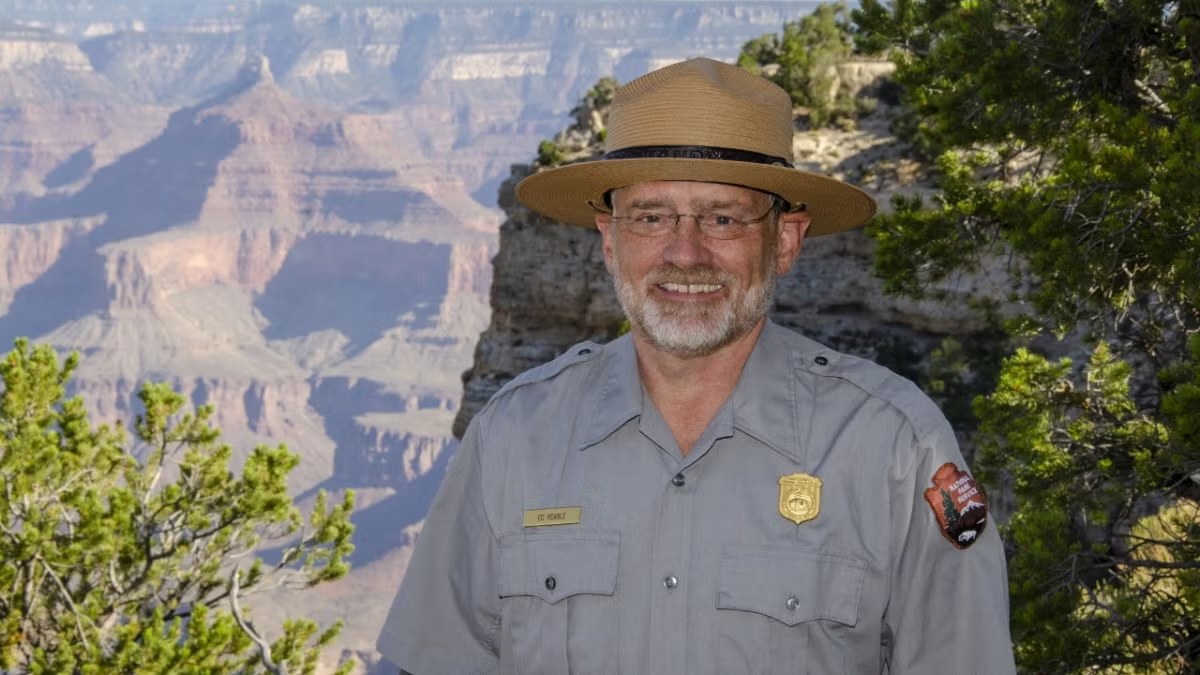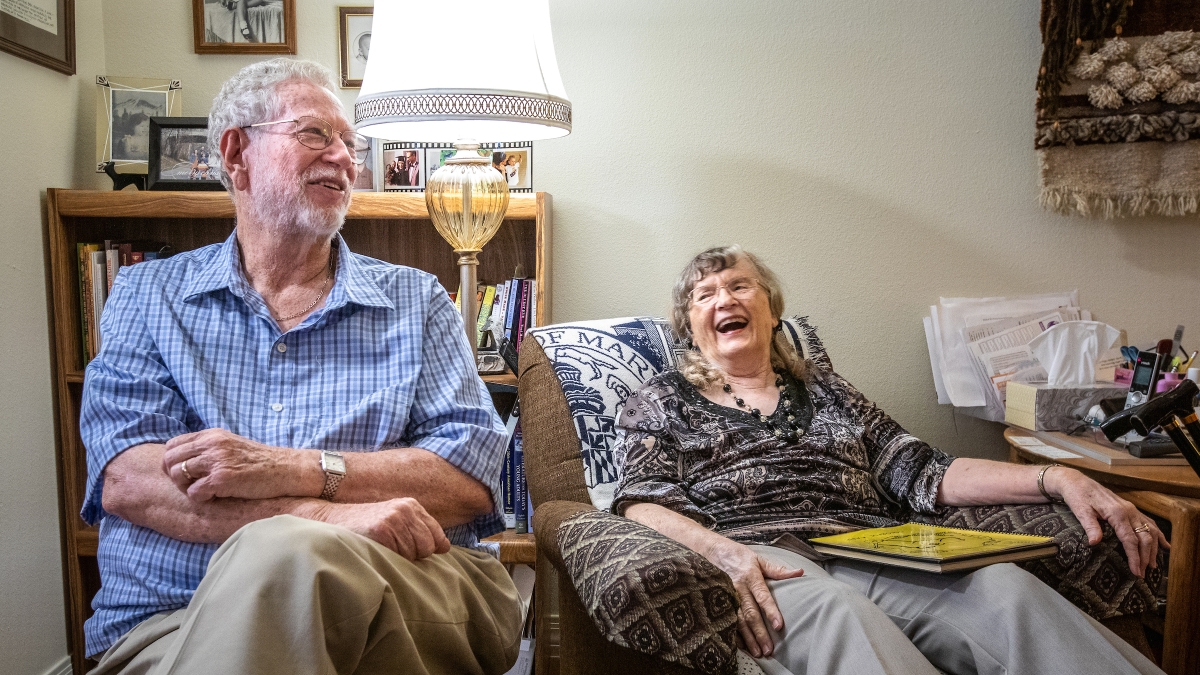If you walk with Don and Alleen Nilsen through the well-manicured retirement community where they reside in Tempe, you might take note of the lovely birds that flit to and fro, or the pleasant bouquet of citrus aromas before they nonchalantly point out the on-site medical building where they tell you they expect to take their last breaths.
“When we pass that big building, we tell our kids, ‘That’s where we’re gonna die,’” Alleen says with a smile, then imitates their vexed response: "'Oh, Mom, don’t say that! That’s creepy!'"
Don laughs, too. “It’s the truth,” he says.
“What is, is,” Alleen adds with a shrug.
This kind of matter-of-fact attitude only serves to make the couple, both professors emeritus of English at Arizona State University — who’ve been together for more than six decades — more endearing. To hear them tell it, life is but a series of often wildly unexpected incidents, best navigated with a good sense of humor.
The subject of humor has played a dominant role in their professional lives, serving as a major focus of their academic and teaching careers. Most recently, their co-authored book, “The Language of Humor: An Introduction,” was awarded the 2019 Association for Applied and Therapeutic Humor Book Award and the pair received the Lifetime Achievement Award from the Association for Applied and Therapeutic Humor.
“There are educational benefits of humor, there are psychological benefits, there are social benefits,” Don said. “For one thing, it keeps your students awake. But another thing humor does, is it has double vision. It allows you to see things from two perspectives. And that's the beauty of humor. It gives you a broader perspective that allows for invention and discovery.”
Video by Ashley Sorensen/ASU Now
Don and Alleen met in a French class at Brigham Young University in the 1950s, and she was quickly taken with him.
“I’d been out with lots of dumb boys,” she said. “I wanted a smart boy, and he was so good at French.”
She made an effort to sit next to him in class, and over the course of the semester, a friendship blossomed. Then, when the day of the final exam came, he didn’t show up. Annoyed, Alleen sought Don out on campus and chided him for his absence only to be met with amusement.
“Oh, I didn’t need to take that class,” he told her. “I was just auditing it. I already learned French in the Army.”
By that time, the die was cast and the two soon became engaged, despite Alleen’s parents’ reticence regarding Don’s humble “farm boy” background.
“But we ended up as well as anybody,” Don said.
“Oh, heavens yes,” Alleen agreed.
Over the years, the Nilsens had three children who accompanied them on their travels as they taught in various locations across the country and the world, collecting a cache of rollicking anecdotes along the way.
There was the time early in their careers, in upstate New York, when their children were very young: They got 102 inches of snow and had to carry the kids home from Sunday school when their car got snowed in. (If you ask Don, it was stuck there all winter. If you ask Alleen, it was two days — a week at the most.)
There was the time shortly after that, in the late 1960s in Afghanistan, when Don bought a beautifully crafted writing slate off a young schoolboy only to see him burst into tears at the realization of the punishment that awaited him if he didn’t have his slate with him in class. (The boy got his slate back. Don did not get his money back.)
Then there was the time at a convention for the Modern Language Association in 1973, when Don happened to meet the late Nick Salerno, an ASU professor emeritus of English, and Marvin Fisher, ASU professor emeritus of English and humanities, and discovered they knew Alleen from their time as classmates at Phoenix Union High School. As luck would have it, both Salerno and Fisher were serving on a search committee for a new professor to join ASU’s Department of English.
Don got the job, and they settled in Arizona, with Alleen joining the ASU English faculty shortly after.
A little less than a decade later, in 1981, Art Buchwald, an American writer and humorist best known for his column in The Washington Post, gave a talk at ASU that inspired the Nilsens and a handful of other ASU English professors interested in humor studies to create a conference on the subject.
Buchwald discouraged the idea.
“He said, ‘You’re going to fail because people are going to come and expect to laugh for four days, and that’s impossible,’” Don said.
Taking Buchwald’s advice to heart, the Nilsens and their colleagues structured the conference so that it was less about making people laugh through presentations that employed various styles of humor and more about dissecting the phenomenon of humor through research and discussions.
In 1982, they founded the Western Humor and Irony Membership and hosted the first humor studies conference at ASU. It was a success and continued annually for six years before universities around the U.S. and then the world began taking turns playing host. The Western Humor and Irony Membership later became the International Society for Humor Studies.
The annual conference is still going strong, taking place this summer at the University of Texas at Austin. In the 37 years since its founding, members of the society have produced more than 900 articles and book reviews, all catalogued in the society's journal, Humor.
In 2011, the Nilsens established the Don and Alleen Nilsen Humor Scholarship Award at ASU for the best humorous online presentation that teaches any aspect of language. And when they’re not disturbing their children with allusions to death, they teach classes at their retirement community, local community colleges and the Osher Lifelong Learning Institute at ASU.
Occasionally, the Nilsens give one-time presentations, like the one they held in July for a group of Mensa members.
Don has a joke he likes to tell at the beginning of his classes about a rabbi, a priest and an engineer, each of whom find themselves in the predicament of being about to meet their demise at the blade of a guillotine. At the moment of no return, both the rabbi and priest invoke their personal deities and the blade does not fall. The engineer is the last to place his head on the block, and while looking up at his fate, he exclaims, “Hey! I see the problem!”
Top photo: Don and Alleen Nilsen laugh as they talk about the many places they’ve worked over their careers and their passion for the global study of humor, at their Tempe home, on June 28, 2019. Photo by Charlie Leight/ASU Now
More Arts, humanities and education
AI literacy course prepares ASU students to set cultural norms for new technology
As the use of artificial intelligence spreads rapidly to every discipline at Arizona State University, it’s essential for students to understand how to ethically wield this powerful technology.Lance…

Grand Canyon National Park superintendent visits ASU, shares about efforts to welcome Indigenous voices back into the park
There are 11 tribes who have historic connections to the land and resources in the Grand Canyon National Park. Sadly, when the park was created, many were forced from those lands, sometimes at…
ASU film professor part of 'Cyberpunk' exhibit at Academy Museum in LA
Arizona State University filmmaker Alex Rivera sees cyberpunk as a perfect vehicle to represent the Latino experience.Cyberpunk is a subgenre of science fiction that explores the intersection of…
